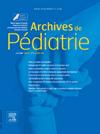General practitioners' knowledge and management of children co-victimized by intimate partner violence
IF 1.3
4区 医学
Q3 PEDIATRICS
引用次数: 0
Abstract
Background
Intimate partner violence (IPV) is a major global public health issue, frequently impacting children as secondary victims. However, research on the involvement of general practitioners (GPs) in identifying and managing children exposed to IPV in France is lacking.
Objective
This study aimed to assess GPs' knowledge and practices regarding child protection in IPV cases, shedding light on gaps in their training and practices.
Methods and Settings
An electronic survey was conducted among GPs in Bretagne from May 2020 to May 2022, assessing demographic characteristics, clinical experiences, management practices for children exposed to IPV, and understanding its impact on children and adolescents.
Results
The study involved 91 GPs (sex ratio: 0.34, median: 15 [interquartile: 5.75–23] years of practice experience, and 25 % [18–30] of their practice focused on paediatrics). Results showed that 67 % encountered IPV situations within the past year, 46 % of children were in danger (2[1–2] per practitioner), and 48 % of children lived in a family with IPV (2[1–3] per practitioner). Thirty-five percent of GPs observed children exposed to IPV without recognizing them as endangered. Regarding knowledge of the impact of IPV on children, practitioners rated it at 5 out of 10, expressing discomfort (Likert scale from 0 to 10 (LS0–10): 4[3:5]) and perceiving their training as inadequate (LS0–10: 3[2:4]). They emphasized the need for better stakeholder understanding, favoring in-person training and enhanced access to specialized consultations to enhance their expertise.
Conclusion
These findings highlight the critical role of GPs in identifying and managing children exposed to IPV in France, despite gaps in knowledge and practice. Strengthening GPs’ training, standardizing protocols, improving and developing access to specialized consultations, such as hospital-based Unit for Endangered Children (“Unité d’Accueil Pédiatrique Enfant en Danger”, UAPED), and fostering interprofessional collaboration could enhance child protection efforts in IPV contexts.
全科医生对共同遭受亲密伴侣暴力的儿童的了解和管理。
背景:亲密伴侣暴力(IPV)是一个重大的全球公共卫生问题,儿童经常作为次要受害者受到影响。然而,关于全科医生(gp)参与识别和管理暴露于IPV的儿童在法国的研究是缺乏的。目的:本研究旨在评估全科医生在IPV案件中关于儿童保护的知识和实践,揭示他们在培训和实践中的差距。方法和环境:于2020年5月至2022年5月对布列塔尼全科医生进行电子调查,评估暴露于IPV儿童的人口统计学特征、临床经验、管理实践,并了解其对儿童和青少年的影响。结果:该研究涉及91名全科医生(性别比:0.34,中位数:15[四分位数间:5.75-23]年的执业经验,25%[18-30]的执业集中在儿科)。结果显示,67%的儿童在过去一年内遇到IPV情况,46%的儿童处于危险之中(每名从业人员2例[1-2]),48%的儿童生活在有IPV的家庭(每名从业人员2例[1-3])。35%的全科医生观察到暴露于IPV的儿童,但没有意识到他们处于危险之中。关于IPV对儿童影响的知识,从业人员将其评为5分(满分为10分),表示不适(李克特量表从0到10 (LS0-10): 4[3:5]),并认为他们的培训不足(LS0-10: 3[2:4])。他们强调需要增进利益攸关方的了解,支持面对面培训和增加获得专门咨询的机会,以提高他们的专业知识。结论:尽管在知识和实践方面存在差距,但这些发现突出了全科医生在识别和管理法国暴露于IPV的儿童方面的关键作用。加强全科医生的培训,使协议标准化,改善和发展获得专门咨询的机会,例如医院的濒危儿童救助单位,以及促进专业间的合作,可以加强在IPV情况下的儿童保护工作。
本文章由计算机程序翻译,如有差异,请以英文原文为准。
求助全文
约1分钟内获得全文
求助全文
来源期刊

Archives De Pediatrie
医学-小儿科
CiteScore
2.80
自引率
5.60%
发文量
106
审稿时长
24.1 weeks
期刊介绍:
Archives de Pédiatrie publishes in English original Research papers, Review articles, Short communications, Practice guidelines, Editorials and Letters in all fields relevant to pediatrics.
Eight issues of Archives de Pédiatrie are released annually, as well as supplementary and special editions to complete these regular issues.
All manuscripts submitted to the journal are subjected to peer review by international experts, and must:
Be written in excellent English, clear and easy to understand, precise and concise;
Bring new, interesting, valid information - and improve clinical care or guide future research;
Be solely the work of the author(s) stated;
Not have been previously published elsewhere and not be under consideration by another journal;
Be in accordance with the journal''s Guide for Authors'' instructions: manuscripts that fail to comply with these rules may be returned to the authors without being reviewed.
Under no circumstances does the journal guarantee publication before the editorial board makes its final decision.
Archives de Pédiatrie is the official publication of the French Society of Pediatrics.
 求助内容:
求助内容: 应助结果提醒方式:
应助结果提醒方式:


